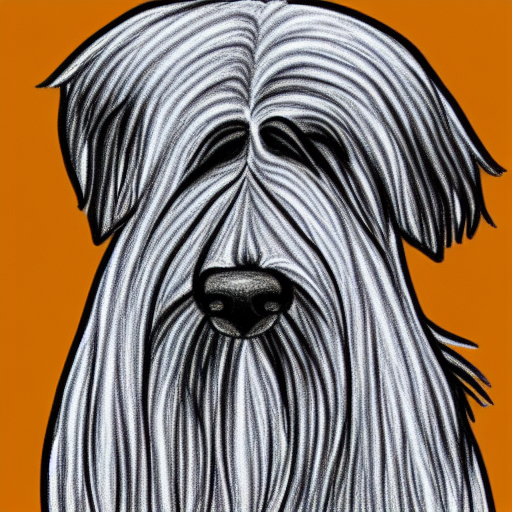The Bearded Collie is one of the herding breeds. It was originally a working dog for Scottish shepherds, but now it is a popular family pet. This breed has a rich history and can be a great addition to any family. They are friendly, intelligent and very devoted to their owners.
Characteristics
The Bearded Collie is a breed of dog that has many characteristics. They are a herding dog that has powerful limbs and an athletic build. These traits make them good for herding cattle and sheep. They are also very active and love being outside. They also love to interact with children.
One of the most important Bearded Collie characteristics is that they need exercise. They need a minimum of one hour of exercise per day. They can be exercised by going for long walks, taking them for bike rides, or hiking. Bearded Collies also need a large yard to run around in, so it is important that you have plenty of space to exercise them.
Other important Bearded Collies characteristics include their high intelligence and level of health. Bearded Collies can have a number of health conditions, such as hip dysplasia, which causes abnormal formation of the hip bone. They can also have eye problems. One of the most common eye problems that affect these dogs is progressive retinal atrophy, which causes blindness. Unfortunately, this condition is incurable. Although the symptoms of this disease are not usually painful or unpleasant, you should visit a vet to be sure.
Bearded Collies have a high energy level and are happiest when playing outdoors. They are best suited to yards with a fenced area. They also need a lot of exercise to maintain their energy levels. You should keep in mind that they are excellent escape artists, so keep an eye on their whereabouts.
A Beardie is an easy dog to train and they usually pick up commands quickly. However, they need a lot of company or they may have trouble with their behavior.
Health
Your Bearded Collie’s health is important, and there are many ways to help keep your pooch healthy. You can visit a veterinarian to make sure your dog isn’t suffering from any common health problems. A veterinarian can perform a blood test to check for diseases, such as hypothyroidism. Once diagnosed, you can begin treatment to prevent or control your pooch’s symptoms.
Some of the more common health conditions that affect Bearded Collies include progressive retinal atrophy and hip dysplasia. These conditions are hereditary, but can also be caused by rapid growth and injury. Another common condition is hypothyroidism, which affects the thyroid gland and can be treated with daily medication. Insufficient levels of steroid hormones in the body can cause vomiting, diarrhea, and lethargy.
Bearded Collies should be taken to the vet as soon as possible after adoption. A veterinarian will be able to spot any obvious issues that might affect your puppy, and can prevent any serious health problems that may arise in the future. You can also check for a host of other diseases and conditions that can affect your pet.
In addition to vaccinations, you should consider giving your dog a regular physical exam. Most people only bring their dogs to the vet when a health problem develops, but it’s important to visit regularly to ensure that your pet is healthy. A veterinarian will run a comprehensive exam and perform lab tests to check for diseases. Your vet will also perform a dental checkup and help you determine the best diet for your dog. The right diet can help your dog live a longer, healthier life.
Bearded Collies need plenty of exercise. Ideally, you should walk your dog for an hour every day. You should also allow your pup to spend time off-lead if possible. This will keep it alert, playful, and mentally stimulated. They do not do well in a solitary environment, so it’s essential to give your dog plenty of space to explore.
Grooming
Bearded Collies need regular grooming because of their long, flowing coat. They shed regularly and should be brushed at least twice a week. To keep their coat looking as good as new, they should be socialized from a young age. This includes acclimating them to new smells and environments. They should also be socialized with other animals.
Grooming a Beardie puppy should begin when it’s still a puppy. Start by checking the puppy’s ears, mouth, and paws to make sure they are clean and free of any infections. You should also check their eyes to make sure they are clear and their eyes are healthy. Weekly exams can help you spot any health issues early.
Bearded Collies should have professional grooming at least once per month. Regular brushing helps prevent shedding and helps prevent infection. Brushing also helps prevent mats in the fur. A professional grooming session can last about an hour. You should also make sure to dry the dog completely after bathing, as moisture can cause skin problems.
Bearded collies are a highly social breed and require plenty of exercise. They are easy to train, but they need lots of attention. If left alone for long periods, they may exhibit behavior problems. However, they are a great companion. Although they are high maintenance dogs, they are extremely adaptable and have an extremely loving personality.
Bearded collie grooming includes brushing the coat and the beard regularly. Ideally, you should use a dog toothbrush and toothpaste. You should also clean the ears regularly. You should also keep the eyes clean and free from twigs and burrs. You should also trim the nails on a monthly basis to keep them short and neat. Regular grooming will also reduce shedding and keep the coat looking its best.
Exercise
Exercise for Bearded Collie dogs is essential for their health and happiness. Their thick double coat helps them adapt to all weather conditions, but their fur is also extremely heavy and causes them to overheat. They should be exercised at least an hour a day to help keep their body temperature in check. Moreover, a Bearded Collie’s diet should be well-controlled to avoid the growth of obesity and other health problems.
Beardies are quite sensitive and can sense your mood. If you become angry, they may shut down and refuse to exercise. Therefore, when exercising, be patient and positive. If you get frustrated, stop exercising immediately. The right exercise will be more successful if you are firm but fair with your dog.
Another way to exercise your Beardie Collie is by taking it for a walk. You can use a harness to walk your dog around. Try pulling the leash diagonally, towards the dog’s back. You can also instruct your dog to lay down by placing your hand on top of its scapula. This way, the dog will make the connection between the forced position and the command.
Bearded Collies need plenty of mental stimulation and exercise. Their long history as herding dogs means that they need daily activities. If they are not active and stimulated enough, they could become couch potatoes. In addition, they may become overweight and unhealthy if they are not regularly exercised.
Beardie dogs love to explore and play. Make sure you give them enough time to exercise every day to avoid boredom and destructive behaviors. You should plan on giving your Beardie at least an hour of exercise per day, which should include an off-leash run or brisk walk.
Behaviour
Bearded Collies are intelligent, lively, and love to interact with people. However, they are often stubborn and independent and require consistent training. Although they are generally friendly and get along well with other dogs, they can also become overly enthusiastic and protective. This is why obedience training is essential. Bearded Collies are great family pets, but they need to be trained to behave in a consistent manner around children, strangers, and other pets.
Bearded Collies are great for households with cats. However, if your cat is especially nippy, your pup may begin to chase it. So, you should teach your dog not to chase cats from the very beginning. Also, don’t let your dog run free around the house when a cat is nearby. Other small animals like rabbits and hamsters may not be compatible with your bearded collie. The age at which you introduce them will determine whether or not they get along with each other.
Bearded Collies have a natural herding instinct. As a result, they make excellent watchdogs. Their barking lets other animals know when they’re approaching. They also bark when they’re happy or lonely. Fortunately, they’re not overly aggressive. If you don’t want your new pet to bark, you should train your bearded collie early on.
Bearded Collies are generally healthy dogs, but there are a few diseases that may affect them. Though not all breeds are prone to the same diseases, it’s important to know the symptoms of these diseases and how to protect your pup from them.













